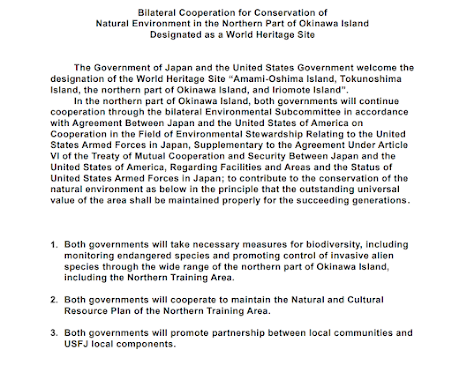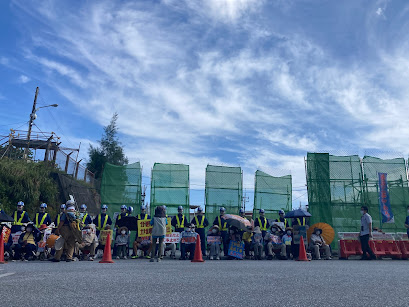OEJP Statement on Japan-U.S. Bilateral Cooperation for the World Heritage Yambaru Forest
The Okinawa Environmental Justice Project welcomes the announcement by the Japanese government of the release of the document “Bilateral Cooperation for Conservation of Natural Environment in the Northern Part of Okinawa Island Designated as a World Heritage Site” on the second-anniversary date (July 26) of the Yambaru forest’s World Heritage inscription.
The OEJP expresses our appreciation to the Japanese and U.S. governments for producing the document. In particular, we appreciate the Japanese Ministry of the Environment for listening to our concerns and requests and navigating the complex road with the U.S. military to produce the document. We also express our great appreciation to the UNESCO World Heritage Centre and the International Union for Conservation of Nature for listening to our concerns and supporting the Japanese government in producing this binding document. We also express our sincere appreciation to local community and civil society members for their persistent efforts and collaboration with the OEJP to raise the issues of the U.S. military’s Northern Training Area even when the Ministry of the Environment, the Okinawa Prefectural Government, and local municipalities were reluctant to do so. We believe the local community and civil society members have played a significant role in this endeavor.
We should be reminded, however, that this document is just a document. It does not guarantee the protection and maintenance of the OUV of the Yambaru forest, as it has intrinsic shortcomings. The wording of the three specific agreements is very vague and could be subject to misinterpretation and manipulation. And unfortunately, we have witnessed how ineffective the Agreement Between Japan and the United States of America on Cooperation in the Field of Environmental Stewardship Relating to the United States Armed Forces in Japan has been in dealing with the issues of PFAS in Okinawa.
Thus, as we have been, the local community and civil society members need to be vigilant and participatory to ensure that proper implementations of the agreements take place to protect and maintain the OUV of the Yambaru forest. We believe that we can make the best use of these agreements as we stay true to the principles of the World Heritage Convention.




